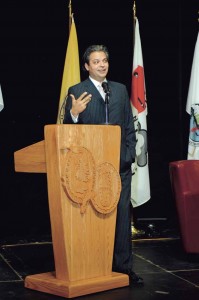The Eeyou-Eenou Economic Development Conference brought together business people and government workers to discuss ways to improve economic prospects in Eeyou Istchee. But one businessperson who attended the November 10-11 event at the Neoskweskau Sports Complex in Mistissini came away disappointed.
Calvin Blacksmith, the owner-operator of Cree Source for Sports in Mistissini, said the two-day conference should have been more action-oriented.
“I feel like at the end of a conference, you are supposed to have a plan of action,” said Blacksmith in a phone interview following the conference.
Blacksmith – who opened his store 14 years ago – thought the meeting should have ended with a briefing to assure participants that their voices were heard and that there are concrete plans to improve communities’ economic situations.
For his part, Andy Baribeau, the director of the Department of Commerce and Industry for the Cree Nation Government, said that a report from the conference would likely be released in December. The event, which attracted 250 participants, was an opportunity to identify strategies to improve and diversify the economies of JBNQ Cree communities, he said.
 “We weren’t pretentious enough to think that we would have an action plan and the solutions after a day and a half,” Baribeau commented in response to the criticism. “But you can identify what the targets and priorities are. The long-term objective is to say, ‘Hey, these are the priorities our business people and youth want’, and to then to sit with our communities and help them get to where they want to go.”
“We weren’t pretentious enough to think that we would have an action plan and the solutions after a day and a half,” Baribeau commented in response to the criticism. “But you can identify what the targets and priorities are. The long-term objective is to say, ‘Hey, these are the priorities our business people and youth want’, and to then to sit with our communities and help them get to where they want to go.”
Baribeau said basic financial literacy must be improved, which requires better communication and coordination between Cree institutions.
He also stressed the need for more independent small business. Too many Crees, said Baribeau, rely on government-related work.
“Those are nice steady jobs, and that’s great,” he said. “But too often we are going outside when we could be going in our communities when it comes to purchasing things and accessing services.”
Blacksmith agrees that it’s time for the Cree to build up their domestic economy. He laments that he has to travel to Val-d’Or or Chibougamau simply to get his vehicle serviced, something that sucks up time and money and puts thousands of additional kilometres on his vehicle every year.
He says he would like to see a car dealership in one of the communities, which he thinks would do good business from domestic Cree business and contracts with Hydro-Québec. “I could sell a truck to anyone,” he quipped.
Blacksmith feels that a dealership is an example of a project that would need to be a partnership between Grand Council and private investor/operators. The capital costs of getting it started would simply be too high otherwise. “The Grand Council is there to stimulate the economy and get our people to work,” he said.
Blacksmith would also like to see a Cree answer to its housing crisis. He envisions a factory, owned and operated by Cree, to produce prefabricated housing that can be shipped to communities for assembly.
Blacksmith even questions the policy of alcohol prohibition. He says that the small town of Radisson, which sits close to Chisasibi, is essentially kept afloat because of alcohol sales to Crees.
A former police officer, Blacksmith says he has travelled to many reserves, and he says that ones that ban alcohol invariably have the most problems with it.
“If you treat your people like kids, they will always act like kids,” said Blacksmith, adding that he’d like to see a pub open up in Chisasibi.

